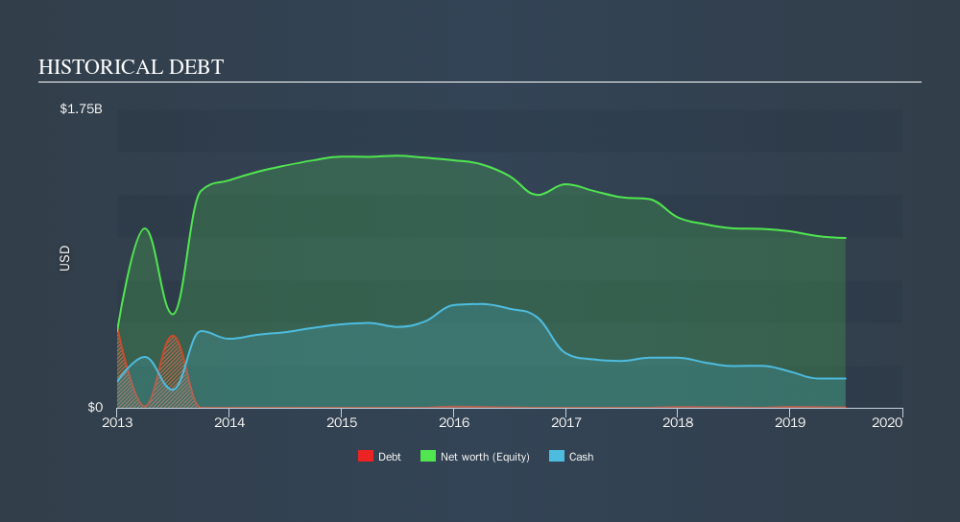Is Frank's International (NYSE:FI) A Risky Investment?

The external fund manager backed by Berkshire Hathaway's Charlie Munger, Li Lu, makes no bones about it when he says 'The biggest investment risk is not the volatility of prices, but whether you will suffer a permanent loss of capital. When we think about how risky a company is, we always like to look at its use of debt, since debt overload can lead to ruin. As with many other companies Frank's International N.V. (NYSE:FI) makes use of debt. But the more important question is: how much risk is that debt creating?
When Is Debt A Problem?
Debt and other liabilities become risky for a business when it cannot easily fulfill those obligations, either with free cash flow or by raising capital at an attractive price. Part and parcel of capitalism is the process of 'creative destruction' where failed businesses are mercilessly liquidated by their bankers. While that is not too common, we often do see indebted companies permanently diluting shareholders because lenders force them to raise capital at a distressed price. Having said that, the most common situation is where a company manages its debt reasonably well - and to its own advantage. When we think about a company's use of debt, we first look at cash and debt together.
See our latest analysis for Frank's International
What Is Frank's International's Debt?
As you can see below, at the end of June 2019, Frank's International had US$2.14m of debt, up from US$1.80m a year ago. Click the image for more detail. However, its balance sheet shows it holds US$172.1m in cash, so it actually has US$170.0m net cash.
How Strong Is Frank's International's Balance Sheet?
Zooming in on the latest balance sheet data, we can see that Frank's International had liabilities of US$117.8m due within 12 months and liabilities of US$58.8m due beyond that. Offsetting this, it had US$172.1m in cash and US$204.6m in receivables that were due within 12 months. So it can boast US$200.1m more liquid assets than total liabilities.
It's good to see that Frank's International has plenty of liquidity on its balance sheet, suggesting conservative management of liabilities. Because it has plenty of assets, it is unlikely to have trouble with its lenders. Simply put, the fact that Frank's International has more cash than debt is arguably a good indication that it can manage its debt safely. There's no doubt that we learn most about debt from the balance sheet. But it is future earnings, more than anything, that will determine Frank's International's ability to maintain a healthy balance sheet going forward. So if you're focused on the future you can check out this free report showing analyst profit forecasts.
In the last year Frank's International wasn't profitable at an EBIT level, but managed to grow its revenue by21%, to US$575m. Shareholders probably have their fingers crossed that it can grow its way to profits.
So How Risky Is Frank's International?
By their very nature companies that are losing money are more risky than those with a long history of profitability. And the fact is that over the last twelve months Frank's International lost money at the earnings before interest and tax (EBIT) line. Indeed, in that time it burnt through US$75m of cash and made a loss of US$66m. But at least it has US$170.0m on the balance sheet to spend on growth, near-term. Frank's International's revenue growth shone bright over the last year, so it may well be in a position to turn a profit in due course. By investing before those profits, shareholders take on more risk in the hope of bigger rewards. When I consider a company to be a bit risky, I think it is responsible to check out whether insiders have been reporting any share sales. Luckily, you can click here ito see our graphic depicting Frank's International insider transactions.
Of course, if you're the type of investor who prefers buying stocks without the burden of debt, then don't hesitate to discover our exclusive list of net cash growth stocks, today.
We aim to bring you long-term focused research analysis driven by fundamental data. Note that our analysis may not factor in the latest price-sensitive company announcements or qualitative material.
If you spot an error that warrants correction, please contact the editor at editorial-team@simplywallst.com. This article by Simply Wall St is general in nature. It does not constitute a recommendation to buy or sell any stock, and does not take account of your objectives, or your financial situation. Simply Wall St has no position in the stocks mentioned. Thank you for reading.

 Yahoo Finance
Yahoo Finance 
